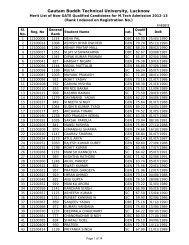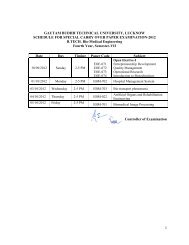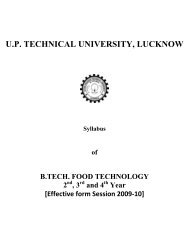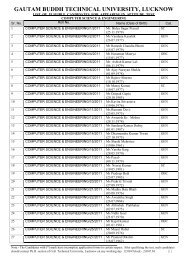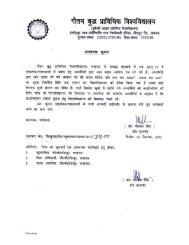NOTE MASTER OF BUSINESS ADMINISTRATION (MBA): The ...
NOTE MASTER OF BUSINESS ADMINISTRATION (MBA): The ...
NOTE MASTER OF BUSINESS ADMINISTRATION (MBA): The ...
Create successful ePaper yourself
Turn your PDF publications into a flip-book with our unique Google optimized e-Paper software.
Unit II (10 Sessions)<br />
Banking: Commercial banks: Industry, constituents, performance, limitations etc. Determination of commercial interest<br />
rates: fixed and floating. Sources of funds and their utilization. Profitability vs. liquidity. Liability management. Management<br />
of capital funds- capital adequacy norms. Gap analysis. Non- performing assets. Strategies for making them viable.<br />
Unit III (8 Sessions)<br />
Securitisation : concepts, nature, scope and their implications. Auto loans, housing loans. Securitisation in India. DFIs in<br />
India ( IDBI, ICICI, IFCI, NABARD, RRBs), State Level Institutions, Banks, NBFCs. <strong>The</strong>ir status, working and strategies for<br />
commercial viability.<br />
Unit IV (6 Sessions)<br />
Insurance services: Life and General. Premium. Risk covered. Tax benefits. Return with risk coverage. Mutual fundsinvestment<br />
avenues. Returns and instruments.<br />
Unit V (8 Sessions)<br />
Leasing and Hire Purchase: Industry. Size and scope. Parties involved. Evaluation of Lease transaction. Types of lease and<br />
their implications. Hire purchase and lease- differences and implications for the business. Others: Factoring, Forfeiting,<br />
Discounting and Re Discounting Of Bills, Consumer Credit and Plastic Money<br />
SUGGESTED READINGS:<br />
1) Fabozzi- Foundations of Financial Markets and Institutions (Pearson Education, 3 rd edition)<br />
2) Khan M Y- Financial Services (Tata McGraw-Hill) 1998.<br />
3) Machiraju H R-Indian Financial System (Vikas, 2004)<br />
4) Bhole L M- Financial Institutions and Markets (Tata McGraw-Hill, 3 rd edition, 2003)<br />
<strong>MBA</strong>-FM 4: TAX PLANNING AND MANAGEMENT Max. Hours: 40<br />
Unit I (8 Sessions)<br />
Nature and scope of tax planning: Nature, Objectives of Tax management. Assessment of tax. Financial year. Assessee -<br />
types Residential status Non-resident Indians.<br />
Unit II (10 Sessions)<br />
Tax on individual income: Salaries. Standard deduction. Valuation of Perquisites Calculation of tax etc. Tax deductible at<br />
source.<br />
Unit III (10 Sessions)<br />
Corporate income tax: Tax concession and incentives for corporate decision. Tax planning for depreciation; Treatment of<br />
losses & unabsorbed items; Carry forward and set off losses. Tax and business reorganization: merger and amalgamation. Tax<br />
appeals; Revision & Review<br />
Unit IV (6 Sessions)<br />
Wealth tax on closely held companies; Valuation of assets; Filing of returns; Assessment; Appeals; Review; Revision and<br />
Rectification<br />
Unit V (6 Sessions)<br />
Central Excise Act 1994 and Excise planning; Customer Protection Act 1962 and Customers planning. (working knowledge is<br />
required for these )<br />
SUGGESTED READINGS:<br />
1) Bhatia H L- Public Finance (Vikas) 1999, 20 th ed.<br />
2) Lakhotia R N- How to Save Wealth Tax (Vision Book) 2001, 9 th ed.<br />
3) Palkhiwala- Income Tax (Tripathi Publication)<br />
4) Prasad Bhagwati- Income Tax Law & Practice (Vishwa Prakashan) 1997, 23 rd ed.<br />
5) Santaram R- Tax Planning by Reports (Taxman) 1978.<br />
6) Singhania V K- Direct Taxes, Law & Practice (Taxman) 2002.<br />
<strong>MBA</strong>-IT 1: DATA BASE MANAGEMENT SYSTEM Max. Hours: 40<br />
Unit I (8 Sessions)<br />
Introduction To Database; Organisation Of Database; Components Of Database Management Systems; Data Models; Entity-<br />
Relationship Model; Network Data Model; Hierarchy Data Model; Semantic Data Model; Advantages Of DBMS<br />
Unit II (8 Sessions)<br />
Basic File Structure Indexed: Sequential; Hashing And File Organisation; Relational Data Model; Relational Calculus; Tuple<br />
Calculus System; Structured English Query Language; Algebraic Operations<br />
Unit III (8 Sessions)<br />
Relational Database Design: Integrity Constraints; Functional Dependencies; Normalisation; Physical Database Design;<br />
Decomposition Of Relation Schemes; Query Processing And Optimisation SQL Queries<br />
Unit IV (8 Sessions)<br />
SQL; Oracle Lab; <strong>The</strong> Client / Server Database Environment<br />
18


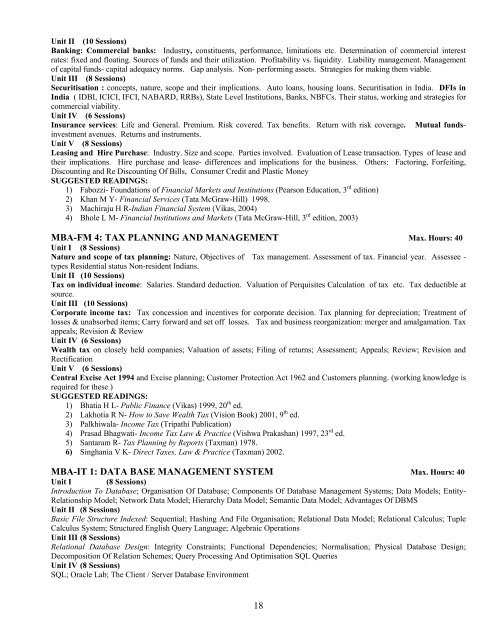
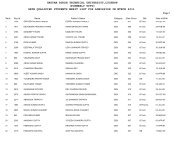
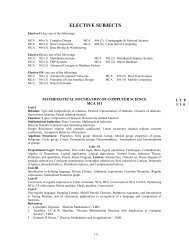
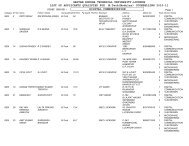
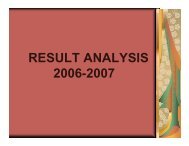
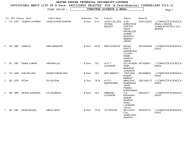
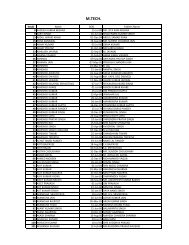
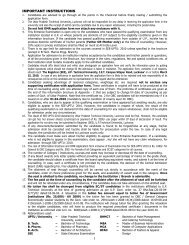
![[MODEL QUESTION PAPER] B-Tech FIRST SEMESTER ...](https://img.yumpu.com/47613205/1/190x245/model-question-paper-b-tech-first-semester-.jpg?quality=85)

